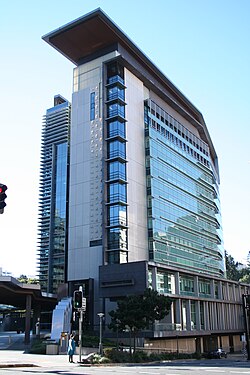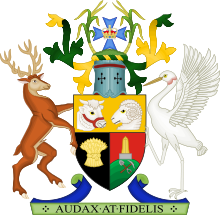Magistrates Court of Queensland
| Magistrates Court of Queensland | |
|---|---|
 |
|

The Brisbane Magistrates Court building, a location of the Magistrates Court
|
|
| Jurisdiction | Queensland, Australia |
| Authorized by | Queensland Parliament via the Magistrates Courts Act 1921 (Qld) |
| Decisions are appealed to | District Court of Queensland |
| Website | www |
| Chief Magistrate of Queensland | |
| Currently | Judge Orazio "Ray" Rinaudo |
| Since | 8 July 2015 |

|
|
Federal Law Courts |
|
Queensland Law Courts
|
Federal Law Courts
Queensland Law Courts
The Magistrates Court of Queensland is the lowest court in the court hierarchy of Queensland, Australia. All criminal proceedings in Queensland begin in the Magistrates Court, with minor offences being dealt with summarily, and more serious ones being referred to a higher court on the strength of evidence. Most criminal cases are first heard in the Magistrates Courts, as are most civil cases. The Magistrates Court hear approximately 95% of all court cases in Queensland.
Decisions made by the Magistrates Court may be heard on appeal to the District Court of Queensland. The Magistrates Court does not have an appellate jurisdiction.
The Chief Magistrate of Queensland, since 2015, is Judge Ray Rinaudo.
The Magistrates Court has the jurisdiction to decide on civil matters for which the amount in dispute is less than or equal to A$150,000. Civil matters in which the amount in dispute is more than $150,000 are decided by either the District Court or the Supreme Court.
The Magistrates Court has the jurisdiction to decide on charges of summary offences, and indictable offence which may be heard summarily.
The Magistrates Court also conducts committal hearings in which the presiding magistrate decides, based on the strength of the evidence, whether to refer the matter to a higher court.
Those present at court typically include the magistrate, police prosecutor, defendant, plaintiff and witnesses for either party. It is a condition that those who enter the court bow to the Queensland Coat of Arms, situated behind the Bench, upon entry. Plaintiffs, defendants, their counsel and witnesses must rise when they wish to address the bench or when addressed by the magistrate.
...
Wikipedia
